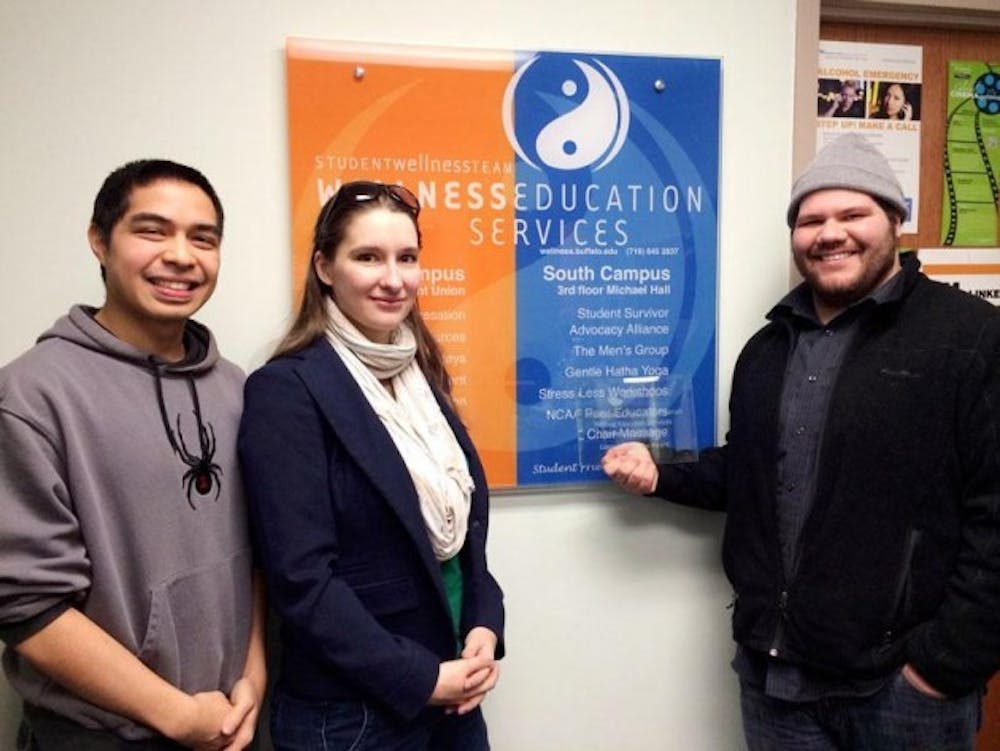In 2006, three male undergraduates from the UB Boxing Club, motivated not by their sport but by a shared goal to combat sexual violence, started the UB Men's Group.
The group is now a peer-run, university-advised program sponsored by UB Student Affairs' Student Wellness Team. The group, which is comprised of men and women trained in peer education and advocacy, offers rape and sexual assault prevention by providing training and events on campus.
"The UB Men's Group has been around for a while, and the real purpose behind it is to cultivate real men as leaders around the issue of sexual violence prevention," said AnnaSotelo-Peryea, a violence prevention specialist and public health planner for Wellness Education Services and adviser for UB Men's Group. "[It] was really created as a way of giving men a role in the issue because, typically, there hasn't been a space for men to get involved proactively to stop this violence in the community."
Aaron Maracle, now the assistant director of SBI Health Education, founded the group with alumni Steve Glamcevski and Pedro Sotelo-Peryea, Anna's husband, who is now an admissions assistant for the Department of Exercise and Nutrition Sciences, after they attended a peer education class about sexual violence.
Men are often the perpetrators in gender-based violence and it gives them a bad name, Maracle said. He believes it is imperative for men to take part in preventing sexual violence and to help change the idea of what a man's role is in sexual violence.
The group has won one local award and several national awards.
Men commit more than 95 percent of gender-based violent acts, according to the Center Against Rape and Domestic Violence.
"There's a small number of guys committing these crimes, [and] they seem over-represented," Anna Sotelo-Peryea said. "It's a weird situation because a majority of men are really good guys who are against this kind of violence. It's really important to mobilize these people in our community."
Maracle said he and his original group members were inspired by One in Four, Inc., a non-profit organization dedicated to the prevention of rape through critical theory, research and rape prevention programming, according to the organization's website. Then, they teamed up withWellness Education Services.
The UB Men's Group provides monthly training in sexual violence prevention and has done so since 2007, according to Sotelo-Peryea. She said the most popular program is the Bystander Intervention Program. Attendees can leave with practical skills, like learning how to intervene in safe ways.
When people make jokes about sexual violence, remaining silent is like accepting this type of culture and language, Maracle said. Bystanders can put a stop to gender-based and sexual violence by speaking up when people make 'rape jokes.'
"In terms of sexual assault, we always say silence does not equal consent, [but] in terms of men and helping prevent violence, silence really does equal consent," Maracle said. "When you don't vocalize, you're consenting to let it happen ... and basically saying you know what's happening, but you're not going to do anything about it."
Peer education is now recognized as a useful intervention tool, Maracle said. To qualify as a leader for the UB Men's Group, students must take the course Introduction to Peer Education (UBE110-WES).
Austin Padua, a junior exercise science major and one of the three current UB Men's Group leaders, said he used to have a tough time handling situations when his friends approached him with their problems. He felt he just made their situations worse. Since taking Intro to Peer Education, however, he believes he can help in an effective way.
"Men and women can be part of the Men's Group and advocate ... what the facts are," said Padua. "We want to separate the facts and myths through our programs."
Maracle emphasized that it isn't necessary to start groups or organize individualized counseling sessions to help sexual violence survivors. Everyone can help by creating "a sense of community" to help victims feel safe and empowered.
Often, our reactions to the experiences of people who have been sexually assaulted can be harmful, according to Sotelo-Peryea. Being part of the group and attending its workshops can teach people to "check their own anger" before attempting to help victims.
The UB Men's Group is accepting applications for members and leaders.
email: features@ubspectrum.com





